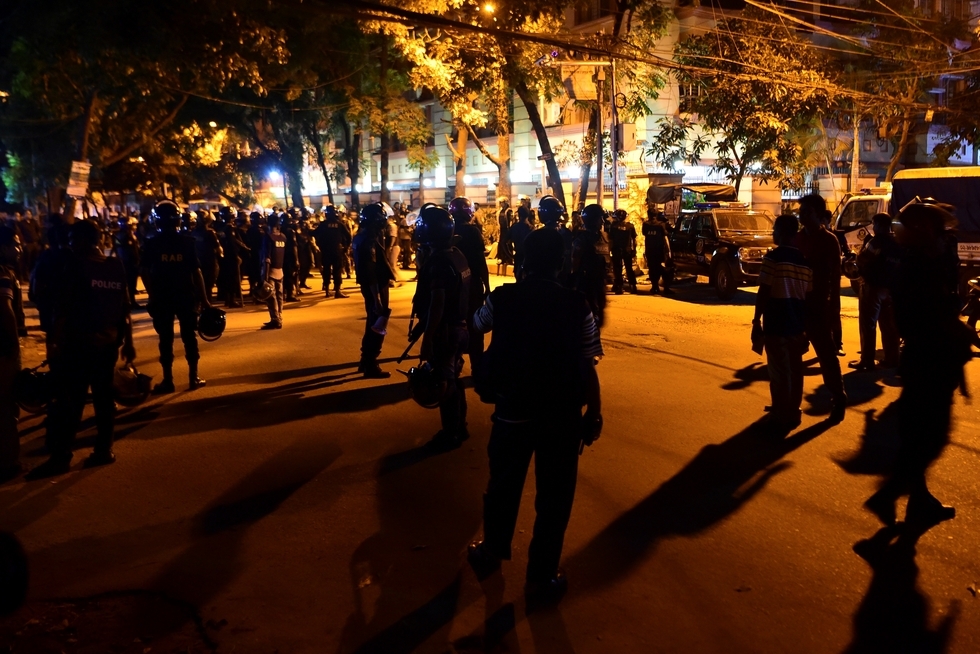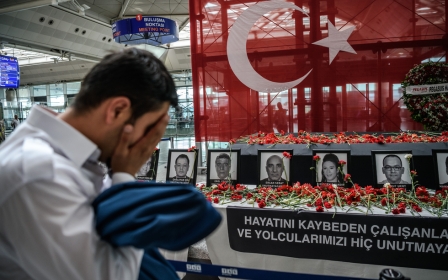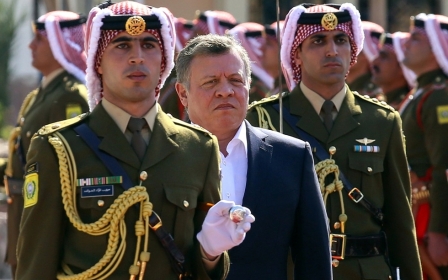Islamic State claims deadly attack in Bangladesh capital

The Islamic State (IS) group claimed responsibility for an attack in the Bangladeshi capital of Dhaka in which at least two police officers were killed, IS-linked media reported.
Gunmen stormed a crowded restaurant popular with foreigners on Friday night, taking diners hostage and sparking a firefight with police, police and witnesses said.
The IS-linked Amaq news agency said more than 20 people of various nationalities were killed in the attack.
The attackers stormed into the Holey Artisan Bakery restaurant in Dhaka's upmarket diplomatic quarter shouting "Allahu Akbar" (God is the Greatest) and opened fire at around 9:20pm (1320 GMT).
The restaurant's supervisor, Sumon Reza, who escaped by jumping from the roof, told a local newspaper there were about 20 foreigners being held hostage and that the attackers had detonated explosives.
"I was on the roof. The whole building was shaking when they set off explosives," he said.
The US State Department said it appeared to be a hostage situation and the White House said US President Barack Obama was following the situation.
A senior Bangladeshi government official confirmed to AFP on condition of anonymity that there were several people inside the restaurant including one Italian national who worked there.
"Police immediately rushed to the place and fired back," district police officer Sayedur Rahman told AFP.
"An unknown number of people are still inside, but we cannot confirm whether they are held hostage," he said.
French Ambassador Sophie Aubert said the restaurant was "very popular" among diplomats and other foreigners in Dhaka.
"We're very concerned that there are some hostages inside," she told AFP, adding she was trying to confirm whether there were foreigners inside.
Heavily armed police and paramilitary guards cordoned off the area as the gunfight broke out.
"There were eight or nine people," one witness told reporters. "They were shouting 'Allahu Akbar' as they entered the restaurant."
Wave of murders
The attack took place near the Nordic Club, where expatriates of Nordic nations gather, and the Qatar Embassy, as Bangladesh was observing the Muslim holy month of Ramadan.
It followed a series of killings targeting foreigners in Bangladesh that have been claimed by IS.
"We are trying to communicate with them [gunmen]. We want to resolve it peacefully," the head of Bangladesh's elite security force Benazir Ahmed told reporters.
Bangladesh has been reeling from a wave of murders of religious minorities and secular activists by suspected Islamist militants.
Earlier on Friday, a Hindu temple worker was hacked to death in western Bangladesh.
Police also shot dead two Muslim students suspected in last month's murder of a Hindu priest and arrested a top hardline militant who masterminded an attack on a Hindu lecturer last month.
The government and police blame homegrown militants for the killings, which they say are part of a plot to destabilise the country.
They have blamed the main opposition Bangladesh Nationalist Party and an Islamist ally.
Last month, authorities under pressure to act on the killings launched a nationwide crackdown on local hardline groups, arresting more than 11,000 people.
Rights groups, however, have charged that the arrests were either arbitrary or a way to silence political opponents of the government.
Experts say a government crackdown on its opponents, including a ban on the country's largest Islamist party after a protracted political crisis, has pushed many towards extremism.
New MEE newsletter: Jerusalem Dispatch
Sign up to get the latest insights and analysis on Israel-Palestine, alongside Turkey Unpacked and other MEE newsletters
Middle East Eye delivers independent and unrivalled coverage and analysis of the Middle East, North Africa and beyond. To learn more about republishing this content and the associated fees, please fill out this form. More about MEE can be found here.




